Canadian Peacekeeping in Rwanda: Successes and Failures Examined
VerifiedAdded on 2022/08/25
|8
|2012
|20
Essay
AI Summary
This essay critically examines Canada's involvement in the United Nations Assistance Mission for Rwanda (UNAMIR) during the 1994 genocide. It explores the failures of the mission, the impact on Canadian soldiers, and the psychological consequences, including PTSD. The essay discusses Canada's historical role as a peacekeeping nation, analyzing the shift in focus and the decline in troop contributions to UN peacekeeping operations. It also considers the influence of national interests and the evolving security landscape post-9/11. The analysis includes references to key figures like Major-General Roméo Dallaire and explores the lasting legacy of the Rwandan genocide on both the nation and the Canadian Armed Forces. The essay concludes by considering the future of Canadian peacekeeping and the potential for Canada to contribute in specific areas. It also examines the views of various scholars regarding the role of Canada's involvement in peacekeeping efforts in Rwanda.
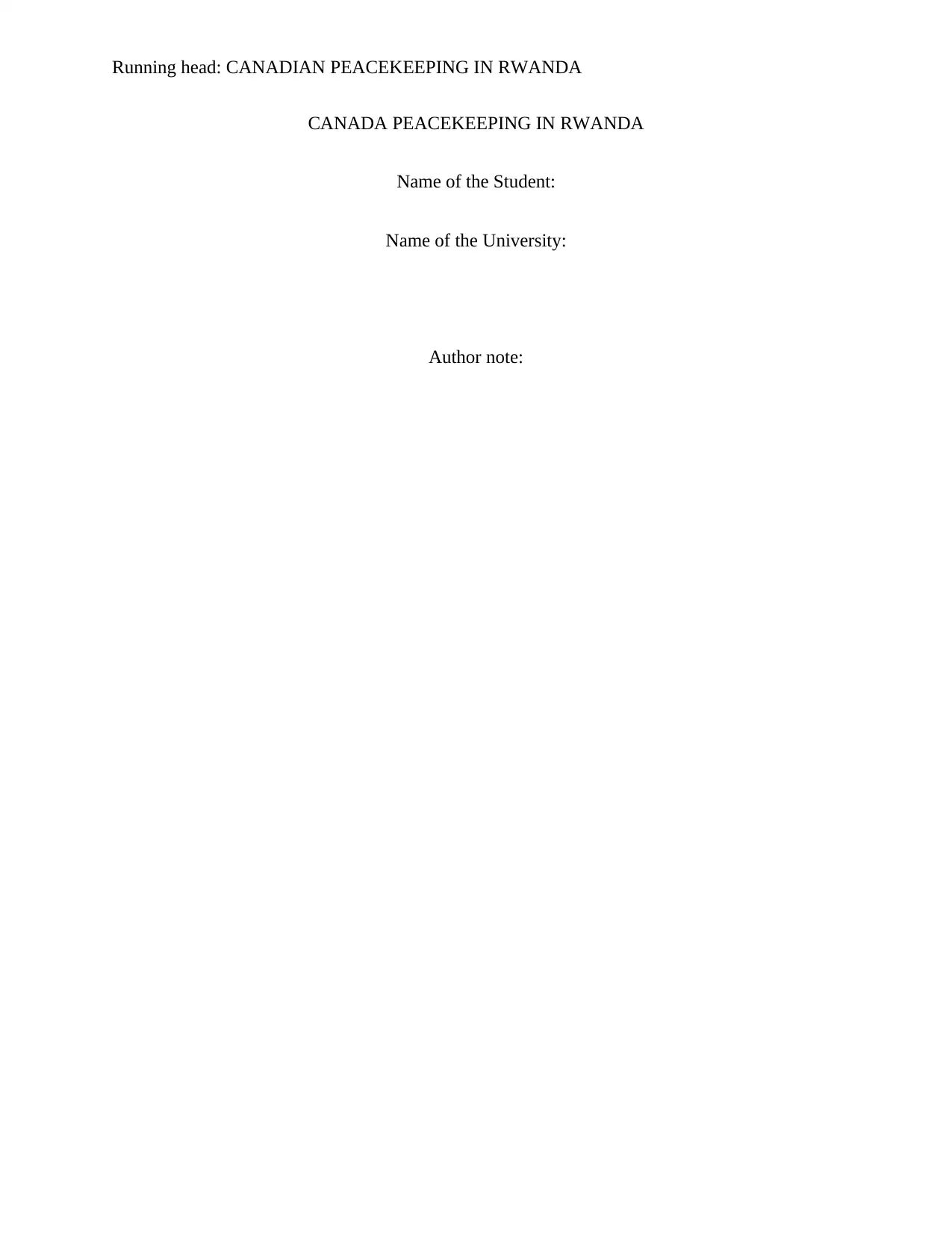
Running head: CANADIAN PEACEKEEPING IN RWANDA
CANADA PEACEKEEPING IN RWANDA
Name of the Student:
Name of the University:
Author note:
CANADA PEACEKEEPING IN RWANDA
Name of the Student:
Name of the University:
Author note:
Paraphrase This Document
Need a fresh take? Get an instant paraphrase of this document with our AI Paraphraser
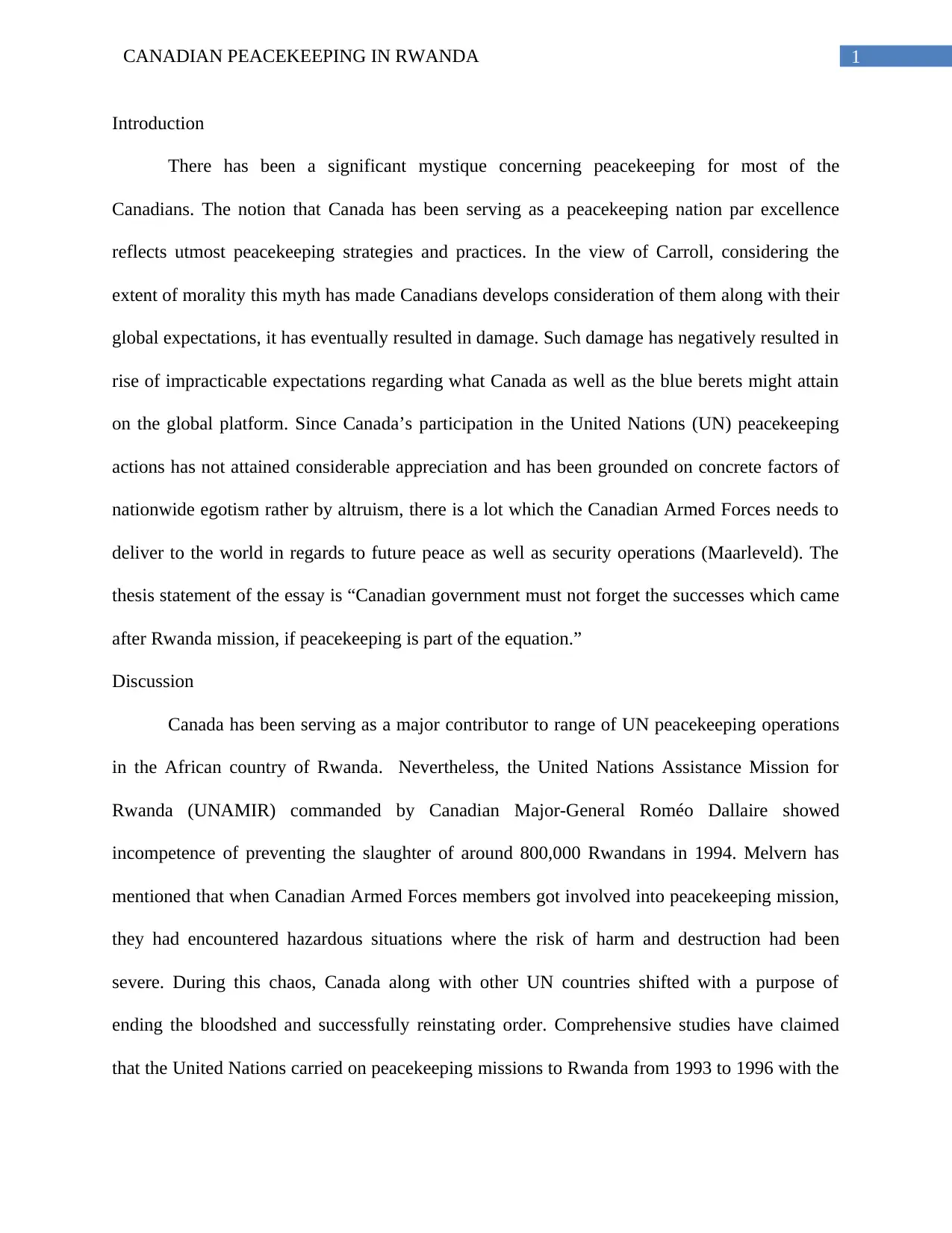
1CANADIAN PEACEKEEPING IN RWANDA
Introduction
There has been a significant mystique concerning peacekeeping for most of the
Canadians. The notion that Canada has been serving as a peacekeeping nation par excellence
reflects utmost peacekeeping strategies and practices. In the view of Carroll, considering the
extent of morality this myth has made Canadians develops consideration of them along with their
global expectations, it has eventually resulted in damage. Such damage has negatively resulted in
rise of impracticable expectations regarding what Canada as well as the blue berets might attain
on the global platform. Since Canada’s participation in the United Nations (UN) peacekeeping
actions has not attained considerable appreciation and has been grounded on concrete factors of
nationwide egotism rather by altruism, there is a lot which the Canadian Armed Forces needs to
deliver to the world in regards to future peace as well as security operations (Maarleveld). The
thesis statement of the essay is “Canadian government must not forget the successes which came
after Rwanda mission, if peacekeeping is part of the equation.”
Discussion
Canada has been serving as a major contributor to range of UN peacekeeping operations
in the African country of Rwanda. Nevertheless, the United Nations Assistance Mission for
Rwanda (UNAMIR) commanded by Canadian Major-General Roméo Dallaire showed
incompetence of preventing the slaughter of around 800,000 Rwandans in 1994. Melvern has
mentioned that when Canadian Armed Forces members got involved into peacekeeping mission,
they had encountered hazardous situations where the risk of harm and destruction had been
severe. During this chaos, Canada along with other UN countries shifted with a purpose of
ending the bloodshed and successfully reinstating order. Comprehensive studies have claimed
that the United Nations carried on peacekeeping missions to Rwanda from 1993 to 1996 with the
Introduction
There has been a significant mystique concerning peacekeeping for most of the
Canadians. The notion that Canada has been serving as a peacekeeping nation par excellence
reflects utmost peacekeeping strategies and practices. In the view of Carroll, considering the
extent of morality this myth has made Canadians develops consideration of them along with their
global expectations, it has eventually resulted in damage. Such damage has negatively resulted in
rise of impracticable expectations regarding what Canada as well as the blue berets might attain
on the global platform. Since Canada’s participation in the United Nations (UN) peacekeeping
actions has not attained considerable appreciation and has been grounded on concrete factors of
nationwide egotism rather by altruism, there is a lot which the Canadian Armed Forces needs to
deliver to the world in regards to future peace as well as security operations (Maarleveld). The
thesis statement of the essay is “Canadian government must not forget the successes which came
after Rwanda mission, if peacekeeping is part of the equation.”
Discussion
Canada has been serving as a major contributor to range of UN peacekeeping operations
in the African country of Rwanda. Nevertheless, the United Nations Assistance Mission for
Rwanda (UNAMIR) commanded by Canadian Major-General Roméo Dallaire showed
incompetence of preventing the slaughter of around 800,000 Rwandans in 1994. Melvern has
mentioned that when Canadian Armed Forces members got involved into peacekeeping mission,
they had encountered hazardous situations where the risk of harm and destruction had been
severe. During this chaos, Canada along with other UN countries shifted with a purpose of
ending the bloodshed and successfully reinstating order. Comprehensive studies have claimed
that the United Nations carried on peacekeeping missions to Rwanda from 1993 to 1996 with the
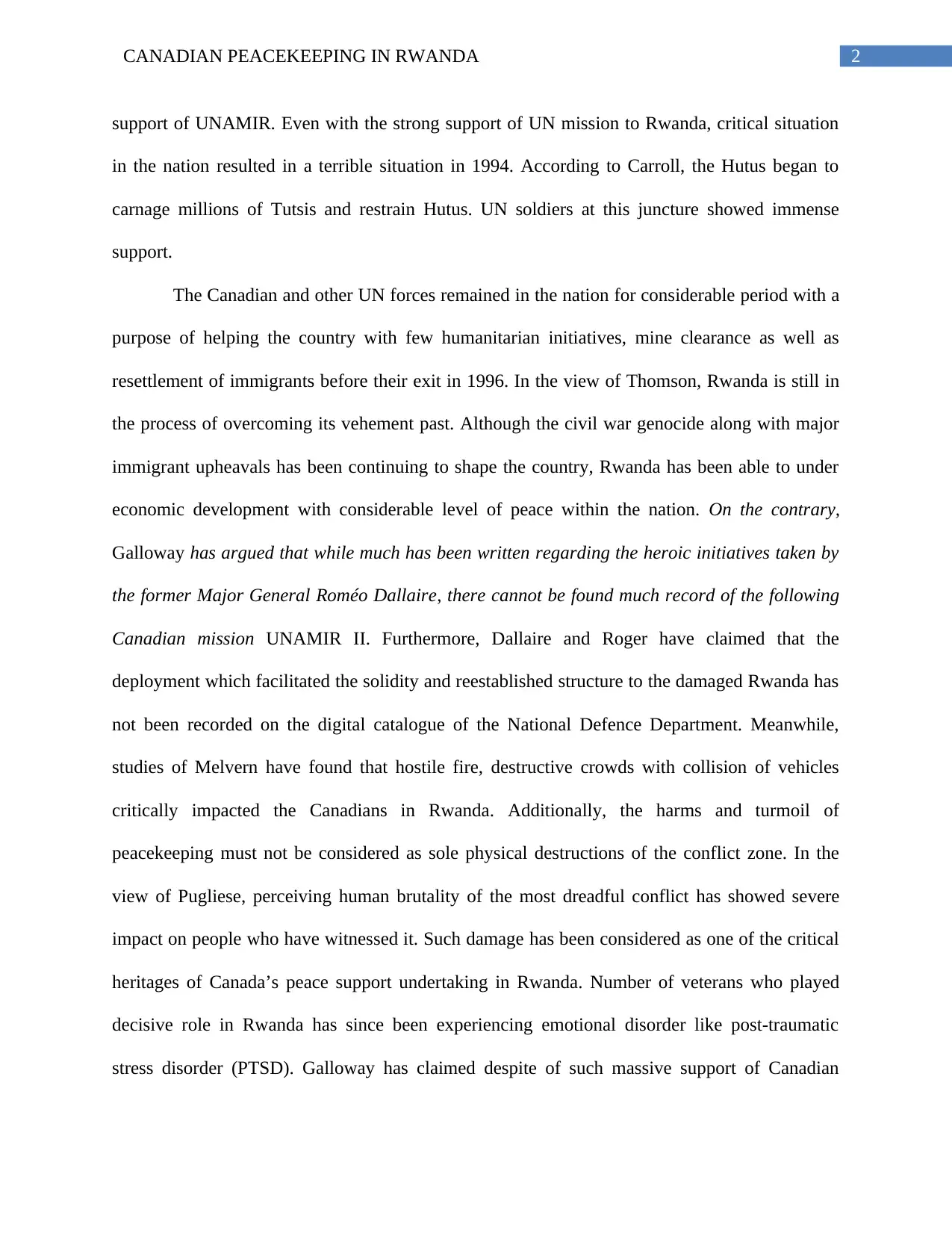
2CANADIAN PEACEKEEPING IN RWANDA
support of UNAMIR. Even with the strong support of UN mission to Rwanda, critical situation
in the nation resulted in a terrible situation in 1994. According to Carroll, the Hutus began to
carnage millions of Tutsis and restrain Hutus. UN soldiers at this juncture showed immense
support.
The Canadian and other UN forces remained in the nation for considerable period with a
purpose of helping the country with few humanitarian initiatives, mine clearance as well as
resettlement of immigrants before their exit in 1996. In the view of Thomson, Rwanda is still in
the process of overcoming its vehement past. Although the civil war genocide along with major
immigrant upheavals has been continuing to shape the country, Rwanda has been able to under
economic development with considerable level of peace within the nation. On the contrary,
Galloway has argued that while much has been written regarding the heroic initiatives taken by
the former Major General Roméo Dallaire, there cannot be found much record of the following
Canadian mission UNAMIR II. Furthermore, Dallaire and Roger have claimed that the
deployment which facilitated the solidity and reestablished structure to the damaged Rwanda has
not been recorded on the digital catalogue of the National Defence Department. Meanwhile,
studies of Melvern have found that hostile fire, destructive crowds with collision of vehicles
critically impacted the Canadians in Rwanda. Additionally, the harms and turmoil of
peacekeeping must not be considered as sole physical destructions of the conflict zone. In the
view of Pugliese, perceiving human brutality of the most dreadful conflict has showed severe
impact on people who have witnessed it. Such damage has been considered as one of the critical
heritages of Canada’s peace support undertaking in Rwanda. Number of veterans who played
decisive role in Rwanda has since been experiencing emotional disorder like post-traumatic
stress disorder (PTSD). Galloway has claimed despite of such massive support of Canadian
support of UNAMIR. Even with the strong support of UN mission to Rwanda, critical situation
in the nation resulted in a terrible situation in 1994. According to Carroll, the Hutus began to
carnage millions of Tutsis and restrain Hutus. UN soldiers at this juncture showed immense
support.
The Canadian and other UN forces remained in the nation for considerable period with a
purpose of helping the country with few humanitarian initiatives, mine clearance as well as
resettlement of immigrants before their exit in 1996. In the view of Thomson, Rwanda is still in
the process of overcoming its vehement past. Although the civil war genocide along with major
immigrant upheavals has been continuing to shape the country, Rwanda has been able to under
economic development with considerable level of peace within the nation. On the contrary,
Galloway has argued that while much has been written regarding the heroic initiatives taken by
the former Major General Roméo Dallaire, there cannot be found much record of the following
Canadian mission UNAMIR II. Furthermore, Dallaire and Roger have claimed that the
deployment which facilitated the solidity and reestablished structure to the damaged Rwanda has
not been recorded on the digital catalogue of the National Defence Department. Meanwhile,
studies of Melvern have found that hostile fire, destructive crowds with collision of vehicles
critically impacted the Canadians in Rwanda. Additionally, the harms and turmoil of
peacekeeping must not be considered as sole physical destructions of the conflict zone. In the
view of Pugliese, perceiving human brutality of the most dreadful conflict has showed severe
impact on people who have witnessed it. Such damage has been considered as one of the critical
heritages of Canada’s peace support undertaking in Rwanda. Number of veterans who played
decisive role in Rwanda has since been experiencing emotional disorder like post-traumatic
stress disorder (PTSD). Galloway has claimed despite of such massive support of Canadian
⊘ This is a preview!⊘
Do you want full access?
Subscribe today to unlock all pages.

Trusted by 1+ million students worldwide
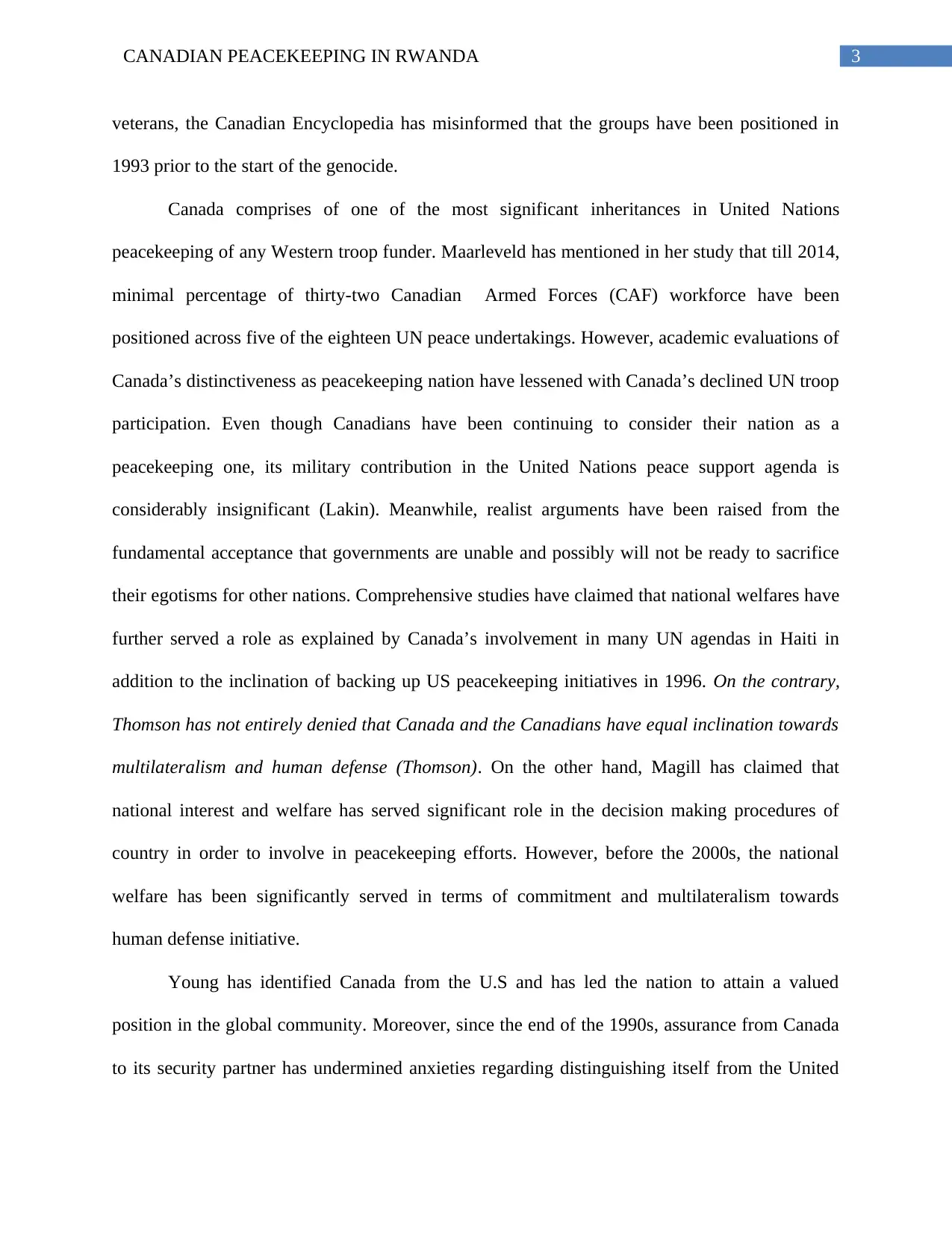
3CANADIAN PEACEKEEPING IN RWANDA
veterans, the Canadian Encyclopedia has misinformed that the groups have been positioned in
1993 prior to the start of the genocide.
Canada comprises of one of the most significant inheritances in United Nations
peacekeeping of any Western troop funder. Maarleveld has mentioned in her study that till 2014,
minimal percentage of thirty-two Canadian Armed Forces (CAF) workforce have been
positioned across five of the eighteen UN peace undertakings. However, academic evaluations of
Canada’s distinctiveness as peacekeeping nation have lessened with Canada’s declined UN troop
participation. Even though Canadians have been continuing to consider their nation as a
peacekeeping one, its military contribution in the United Nations peace support agenda is
considerably insignificant (Lakin). Meanwhile, realist arguments have been raised from the
fundamental acceptance that governments are unable and possibly will not be ready to sacrifice
their egotisms for other nations. Comprehensive studies have claimed that national welfares have
further served a role as explained by Canada’s involvement in many UN agendas in Haiti in
addition to the inclination of backing up US peacekeeping initiatives in 1996. On the contrary,
Thomson has not entirely denied that Canada and the Canadians have equal inclination towards
multilateralism and human defense (Thomson). On the other hand, Magill has claimed that
national interest and welfare has served significant role in the decision making procedures of
country in order to involve in peacekeeping efforts. However, before the 2000s, the national
welfare has been significantly served in terms of commitment and multilateralism towards
human defense initiative.
Young has identified Canada from the U.S and has led the nation to attain a valued
position in the global community. Moreover, since the end of the 1990s, assurance from Canada
to its security partner has undermined anxieties regarding distinguishing itself from the United
veterans, the Canadian Encyclopedia has misinformed that the groups have been positioned in
1993 prior to the start of the genocide.
Canada comprises of one of the most significant inheritances in United Nations
peacekeeping of any Western troop funder. Maarleveld has mentioned in her study that till 2014,
minimal percentage of thirty-two Canadian Armed Forces (CAF) workforce have been
positioned across five of the eighteen UN peace undertakings. However, academic evaluations of
Canada’s distinctiveness as peacekeeping nation have lessened with Canada’s declined UN troop
participation. Even though Canadians have been continuing to consider their nation as a
peacekeeping one, its military contribution in the United Nations peace support agenda is
considerably insignificant (Lakin). Meanwhile, realist arguments have been raised from the
fundamental acceptance that governments are unable and possibly will not be ready to sacrifice
their egotisms for other nations. Comprehensive studies have claimed that national welfares have
further served a role as explained by Canada’s involvement in many UN agendas in Haiti in
addition to the inclination of backing up US peacekeeping initiatives in 1996. On the contrary,
Thomson has not entirely denied that Canada and the Canadians have equal inclination towards
multilateralism and human defense (Thomson). On the other hand, Magill has claimed that
national interest and welfare has served significant role in the decision making procedures of
country in order to involve in peacekeeping efforts. However, before the 2000s, the national
welfare has been significantly served in terms of commitment and multilateralism towards
human defense initiative.
Young has identified Canada from the U.S and has led the nation to attain a valued
position in the global community. Moreover, since the end of the 1990s, assurance from Canada
to its security partner has undermined anxieties regarding distinguishing itself from the United
Paraphrase This Document
Need a fresh take? Get an instant paraphrase of this document with our AI Paraphraser
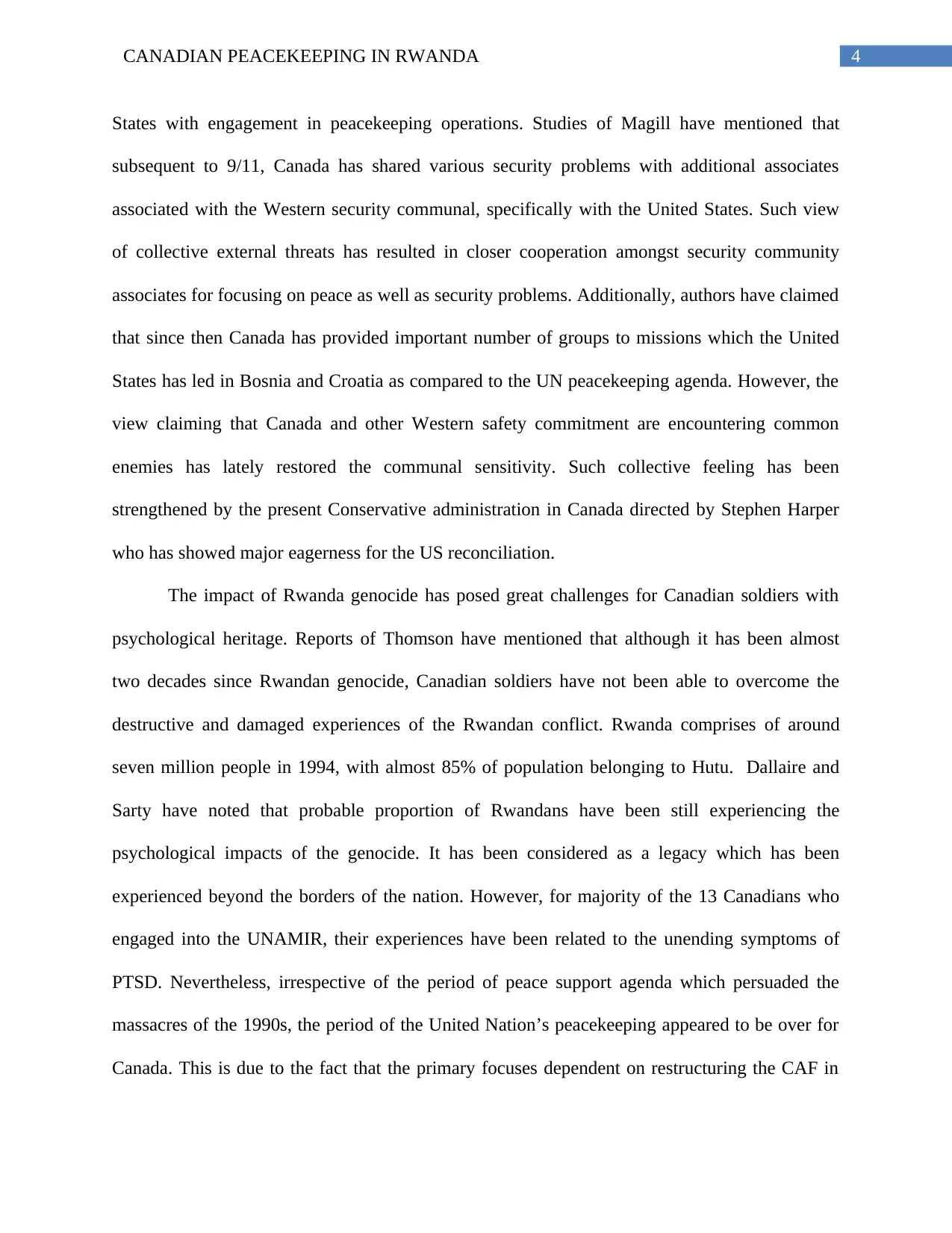
4CANADIAN PEACEKEEPING IN RWANDA
States with engagement in peacekeeping operations. Studies of Magill have mentioned that
subsequent to 9/11, Canada has shared various security problems with additional associates
associated with the Western security communal, specifically with the United States. Such view
of collective external threats has resulted in closer cooperation amongst security community
associates for focusing on peace as well as security problems. Additionally, authors have claimed
that since then Canada has provided important number of groups to missions which the United
States has led in Bosnia and Croatia as compared to the UN peacekeeping agenda. However, the
view claiming that Canada and other Western safety commitment are encountering common
enemies has lately restored the communal sensitivity. Such collective feeling has been
strengthened by the present Conservative administration in Canada directed by Stephen Harper
who has showed major eagerness for the US reconciliation.
The impact of Rwanda genocide has posed great challenges for Canadian soldiers with
psychological heritage. Reports of Thomson have mentioned that although it has been almost
two decades since Rwandan genocide, Canadian soldiers have not been able to overcome the
destructive and damaged experiences of the Rwandan conflict. Rwanda comprises of around
seven million people in 1994, with almost 85% of population belonging to Hutu. Dallaire and
Sarty have noted that probable proportion of Rwandans have been still experiencing the
psychological impacts of the genocide. It has been considered as a legacy which has been
experienced beyond the borders of the nation. However, for majority of the 13 Canadians who
engaged into the UNAMIR, their experiences have been related to the unending symptoms of
PTSD. Nevertheless, irrespective of the period of peace support agenda which persuaded the
massacres of the 1990s, the period of the United Nation’s peacekeeping appeared to be over for
Canada. This is due to the fact that the primary focuses dependent on restructuring the CAF in
States with engagement in peacekeeping operations. Studies of Magill have mentioned that
subsequent to 9/11, Canada has shared various security problems with additional associates
associated with the Western security communal, specifically with the United States. Such view
of collective external threats has resulted in closer cooperation amongst security community
associates for focusing on peace as well as security problems. Additionally, authors have claimed
that since then Canada has provided important number of groups to missions which the United
States has led in Bosnia and Croatia as compared to the UN peacekeeping agenda. However, the
view claiming that Canada and other Western safety commitment are encountering common
enemies has lately restored the communal sensitivity. Such collective feeling has been
strengthened by the present Conservative administration in Canada directed by Stephen Harper
who has showed major eagerness for the US reconciliation.
The impact of Rwanda genocide has posed great challenges for Canadian soldiers with
psychological heritage. Reports of Thomson have mentioned that although it has been almost
two decades since Rwandan genocide, Canadian soldiers have not been able to overcome the
destructive and damaged experiences of the Rwandan conflict. Rwanda comprises of around
seven million people in 1994, with almost 85% of population belonging to Hutu. Dallaire and
Sarty have noted that probable proportion of Rwandans have been still experiencing the
psychological impacts of the genocide. It has been considered as a legacy which has been
experienced beyond the borders of the nation. However, for majority of the 13 Canadians who
engaged into the UNAMIR, their experiences have been related to the unending symptoms of
PTSD. Nevertheless, irrespective of the period of peace support agenda which persuaded the
massacres of the 1990s, the period of the United Nation’s peacekeeping appeared to be over for
Canada. This is due to the fact that the primary focuses dependent on restructuring the CAF in
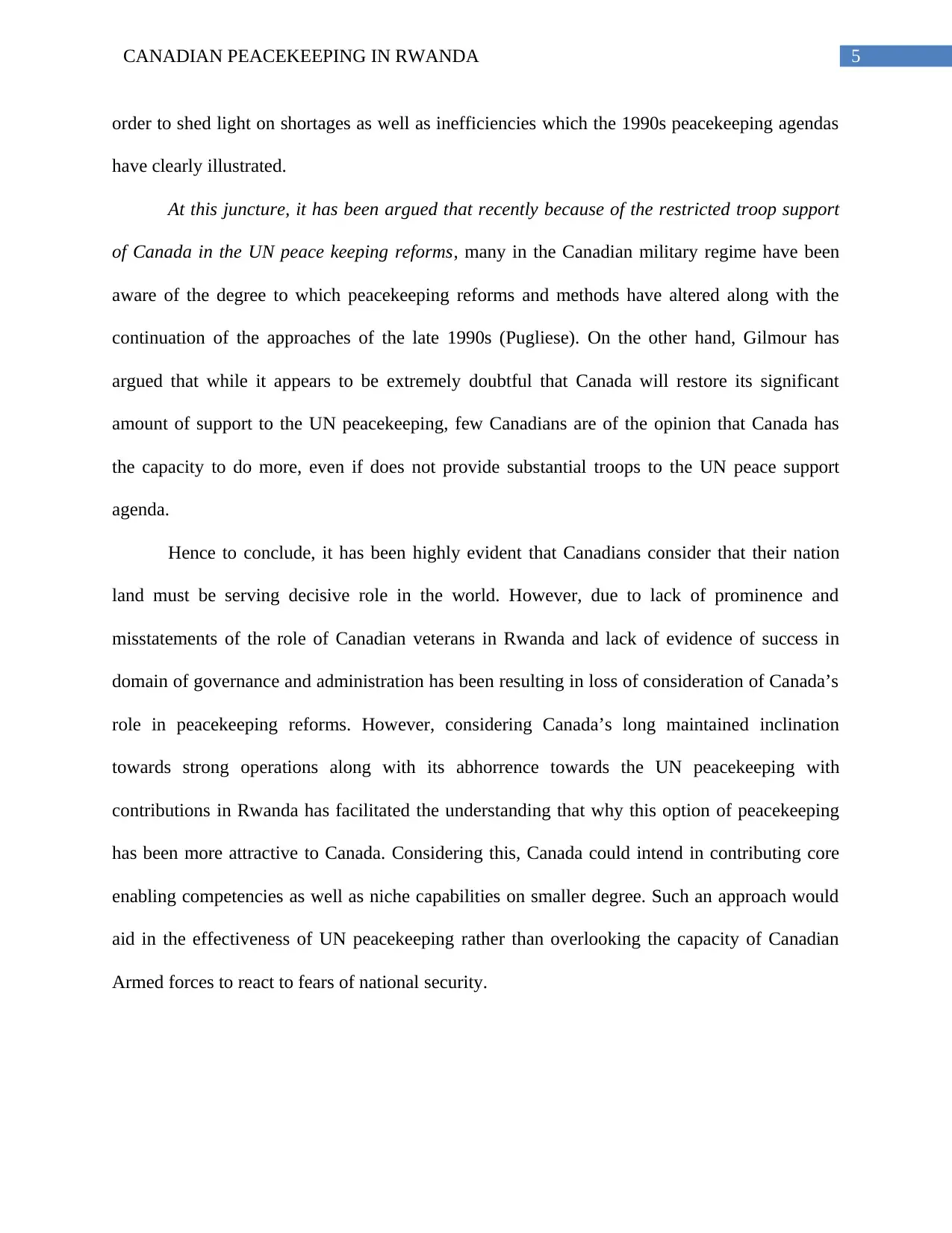
5CANADIAN PEACEKEEPING IN RWANDA
order to shed light on shortages as well as inefficiencies which the 1990s peacekeeping agendas
have clearly illustrated.
At this juncture, it has been argued that recently because of the restricted troop support
of Canada in the UN peace keeping reforms, many in the Canadian military regime have been
aware of the degree to which peacekeeping reforms and methods have altered along with the
continuation of the approaches of the late 1990s (Pugliese). On the other hand, Gilmour has
argued that while it appears to be extremely doubtful that Canada will restore its significant
amount of support to the UN peacekeeping, few Canadians are of the opinion that Canada has
the capacity to do more, even if does not provide substantial troops to the UN peace support
agenda.
Hence to conclude, it has been highly evident that Canadians consider that their nation
land must be serving decisive role in the world. However, due to lack of prominence and
misstatements of the role of Canadian veterans in Rwanda and lack of evidence of success in
domain of governance and administration has been resulting in loss of consideration of Canada’s
role in peacekeeping reforms. However, considering Canada’s long maintained inclination
towards strong operations along with its abhorrence towards the UN peacekeeping with
contributions in Rwanda has facilitated the understanding that why this option of peacekeeping
has been more attractive to Canada. Considering this, Canada could intend in contributing core
enabling competencies as well as niche capabilities on smaller degree. Such an approach would
aid in the effectiveness of UN peacekeeping rather than overlooking the capacity of Canadian
Armed forces to react to fears of national security.
order to shed light on shortages as well as inefficiencies which the 1990s peacekeeping agendas
have clearly illustrated.
At this juncture, it has been argued that recently because of the restricted troop support
of Canada in the UN peace keeping reforms, many in the Canadian military regime have been
aware of the degree to which peacekeeping reforms and methods have altered along with the
continuation of the approaches of the late 1990s (Pugliese). On the other hand, Gilmour has
argued that while it appears to be extremely doubtful that Canada will restore its significant
amount of support to the UN peacekeeping, few Canadians are of the opinion that Canada has
the capacity to do more, even if does not provide substantial troops to the UN peace support
agenda.
Hence to conclude, it has been highly evident that Canadians consider that their nation
land must be serving decisive role in the world. However, due to lack of prominence and
misstatements of the role of Canadian veterans in Rwanda and lack of evidence of success in
domain of governance and administration has been resulting in loss of consideration of Canada’s
role in peacekeeping reforms. However, considering Canada’s long maintained inclination
towards strong operations along with its abhorrence towards the UN peacekeeping with
contributions in Rwanda has facilitated the understanding that why this option of peacekeeping
has been more attractive to Canada. Considering this, Canada could intend in contributing core
enabling competencies as well as niche capabilities on smaller degree. Such an approach would
aid in the effectiveness of UN peacekeeping rather than overlooking the capacity of Canadian
Armed forces to react to fears of national security.
⊘ This is a preview!⊘
Do you want full access?
Subscribe today to unlock all pages.

Trusted by 1+ million students worldwide
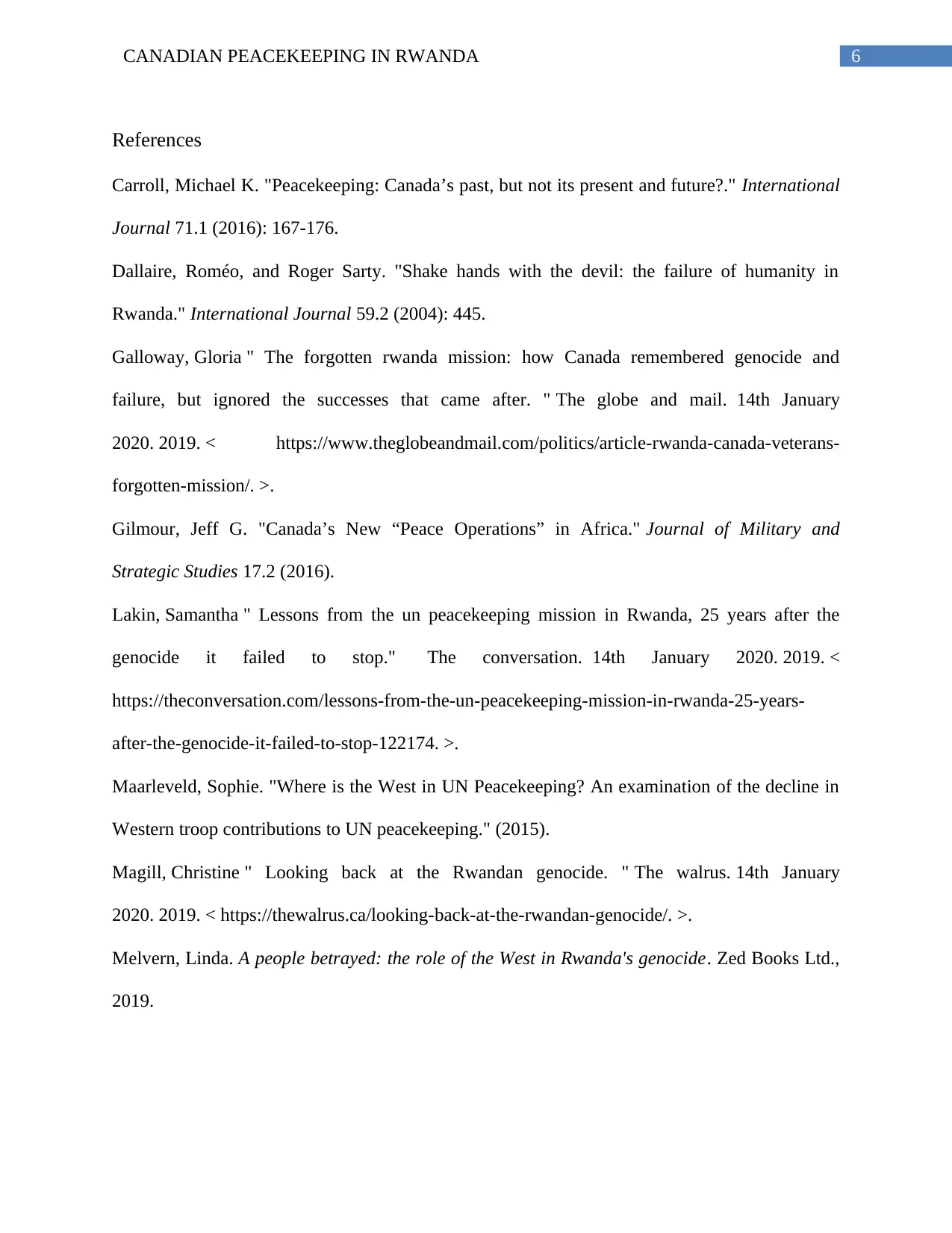
6CANADIAN PEACEKEEPING IN RWANDA
References
Carroll, Michael K. "Peacekeeping: Canada’s past, but not its present and future?." International
Journal 71.1 (2016): 167-176.
Dallaire, Roméo, and Roger Sarty. "Shake hands with the devil: the failure of humanity in
Rwanda." International Journal 59.2 (2004): 445.
Galloway, Gloria " The forgotten rwanda mission: how Canada remembered genocide and
failure, but ignored the successes that came after. " The globe and mail. 14th January
2020. 2019. < https://www.theglobeandmail.com/politics/article-rwanda-canada-veterans-
forgotten-mission/. >.
Gilmour, Jeff G. "Canada’s New “Peace Operations” in Africa." Journal of Military and
Strategic Studies 17.2 (2016).
Lakin, Samantha " Lessons from the un peacekeeping mission in Rwanda, 25 years after the
genocide it failed to stop." The conversation. 14th January 2020. 2019. <
https://theconversation.com/lessons-from-the-un-peacekeeping-mission-in-rwanda-25-years-
after-the-genocide-it-failed-to-stop-122174. >.
Maarleveld, Sophie. "Where is the West in UN Peacekeeping? An examination of the decline in
Western troop contributions to UN peacekeeping." (2015).
Magill, Christine " Looking back at the Rwandan genocide. " The walrus. 14th January
2020. 2019. < https://thewalrus.ca/looking-back-at-the-rwandan-genocide/. >.
Melvern, Linda. A people betrayed: the role of the West in Rwanda's genocide. Zed Books Ltd.,
2019.
References
Carroll, Michael K. "Peacekeeping: Canada’s past, but not its present and future?." International
Journal 71.1 (2016): 167-176.
Dallaire, Roméo, and Roger Sarty. "Shake hands with the devil: the failure of humanity in
Rwanda." International Journal 59.2 (2004): 445.
Galloway, Gloria " The forgotten rwanda mission: how Canada remembered genocide and
failure, but ignored the successes that came after. " The globe and mail. 14th January
2020. 2019. < https://www.theglobeandmail.com/politics/article-rwanda-canada-veterans-
forgotten-mission/. >.
Gilmour, Jeff G. "Canada’s New “Peace Operations” in Africa." Journal of Military and
Strategic Studies 17.2 (2016).
Lakin, Samantha " Lessons from the un peacekeeping mission in Rwanda, 25 years after the
genocide it failed to stop." The conversation. 14th January 2020. 2019. <
https://theconversation.com/lessons-from-the-un-peacekeeping-mission-in-rwanda-25-years-
after-the-genocide-it-failed-to-stop-122174. >.
Maarleveld, Sophie. "Where is the West in UN Peacekeeping? An examination of the decline in
Western troop contributions to UN peacekeeping." (2015).
Magill, Christine " Looking back at the Rwandan genocide. " The walrus. 14th January
2020. 2019. < https://thewalrus.ca/looking-back-at-the-rwandan-genocide/. >.
Melvern, Linda. A people betrayed: the role of the West in Rwanda's genocide. Zed Books Ltd.,
2019.
Paraphrase This Document
Need a fresh take? Get an instant paraphrase of this document with our AI Paraphraser
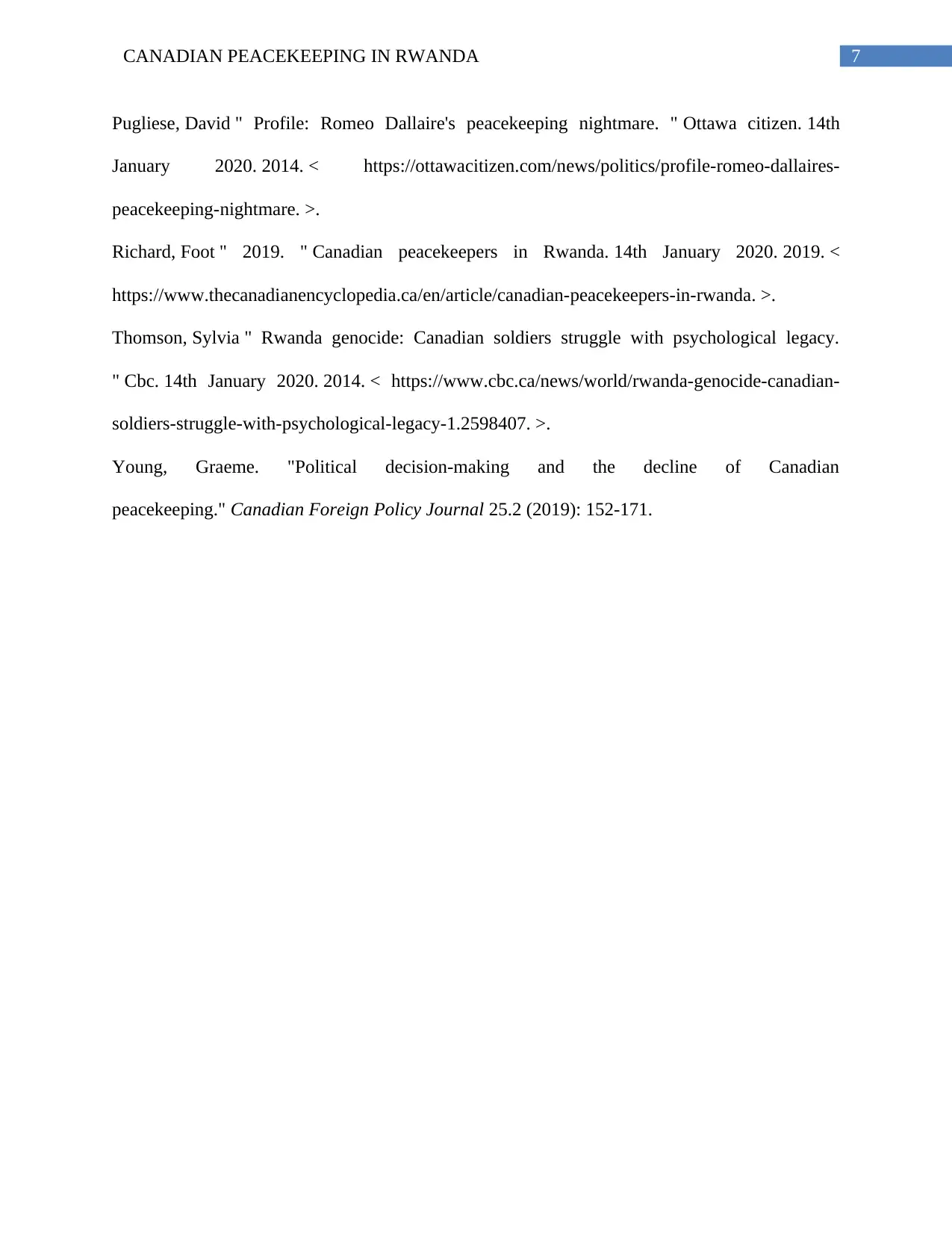
7CANADIAN PEACEKEEPING IN RWANDA
Pugliese, David " Profile: Romeo Dallaire's peacekeeping nightmare. " Ottawa citizen. 14th
January 2020. 2014. < https://ottawacitizen.com/news/politics/profile-romeo-dallaires-
peacekeeping-nightmare. >.
Richard, Foot " 2019. " Canadian peacekeepers in Rwanda. 14th January 2020. 2019. <
https://www.thecanadianencyclopedia.ca/en/article/canadian-peacekeepers-in-rwanda. >.
Thomson, Sylvia " Rwanda genocide: Canadian soldiers struggle with psychological legacy.
" Cbc. 14th January 2020. 2014. < https://www.cbc.ca/news/world/rwanda-genocide-canadian-
soldiers-struggle-with-psychological-legacy-1.2598407. >.
Young, Graeme. "Political decision-making and the decline of Canadian
peacekeeping." Canadian Foreign Policy Journal 25.2 (2019): 152-171.
Pugliese, David " Profile: Romeo Dallaire's peacekeeping nightmare. " Ottawa citizen. 14th
January 2020. 2014. < https://ottawacitizen.com/news/politics/profile-romeo-dallaires-
peacekeeping-nightmare. >.
Richard, Foot " 2019. " Canadian peacekeepers in Rwanda. 14th January 2020. 2019. <
https://www.thecanadianencyclopedia.ca/en/article/canadian-peacekeepers-in-rwanda. >.
Thomson, Sylvia " Rwanda genocide: Canadian soldiers struggle with psychological legacy.
" Cbc. 14th January 2020. 2014. < https://www.cbc.ca/news/world/rwanda-genocide-canadian-
soldiers-struggle-with-psychological-legacy-1.2598407. >.
Young, Graeme. "Political decision-making and the decline of Canadian
peacekeeping." Canadian Foreign Policy Journal 25.2 (2019): 152-171.
1 out of 8
Related Documents
Your All-in-One AI-Powered Toolkit for Academic Success.
+13062052269
info@desklib.com
Available 24*7 on WhatsApp / Email
![[object Object]](/_next/static/media/star-bottom.7253800d.svg)
Unlock your academic potential
Copyright © 2020–2026 A2Z Services. All Rights Reserved. Developed and managed by ZUCOL.



